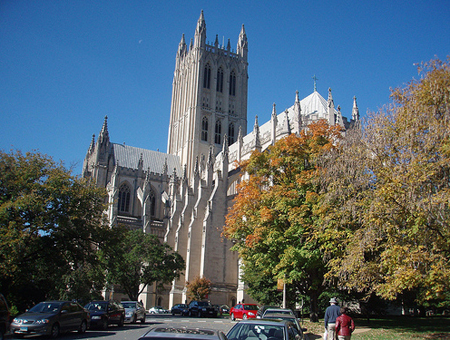Priest Reacts To Study On Youths' Religious Beliefs

The National Cathedral in Washington, D.C.
(Creative Commons)
As the Pew Research study on youth and religion released this past Thursday continues garnering national attention, one USC religion professor -- who is also a Catholic priest -- explains the findings as a reflection of individualism in modern culture.
Fr. James Heft, S.M., said the discrepancy between religious affiliation, and religious beliefs and practices among youth, "reflects a strong strain in the culture which is a kind of individualism, a do-it-yourself attitude, a put it together as you see it mentality."
The study found that although less young Americans affiliate with a particular religion, they remain just as traditional in their religious beliefs and practices as their parents were at their age.
Allison Pond, a Pew research associate who worked on the study, agrees youth take a more individualist approach towards religion.
"The idea is that young people will draw from many different traditions, doctrines and beliefs, rather than just subscribing to one thing," said Pond.
The social and political views among young adults today seem to support the conclusion they engage in a hodge-podge of life philosophies.
The Pew study finds young adults, ranging in ages from 18- to 29-years-old, are more inclined to see evolution as the best explanation for human life. They're less prone to perceive Hollywood as threatening their moral values. And they're more likely than older Americans to accept homosexuality.
At the same time, Millennials are slightly more supportive than their elders of government efforts to protect morality and somewhat more comfortable with churches and other houses of worship being involved in politics.
Heft sees the hodge-podge approach of youth as beneficial in that "a person finds a certain comfort level in their own spiritual life that way."
"What they lack would be the wisdom and rituals of traditions that have sustained and carried religious belief, sometimes for millennium," he said.
Heft believes traditions, when kept alive and vital, embody the wisdom of multiple generations much more than any single generation or single individual.
"On the other hand," said Heft, "if traditions grow ridge and moribund, if they give no spiritual nourishment, it's not difficult to understand why young people are wandering away from them."
Heft criticizes congregations for not inspiring youth to participate in organized religion and said religious groups should provide youth more opportunity for personal spirituality.
When asked what sparked the drop off in youth religious affiliation, Heft said the American culture of individualism, secularism and pluralism now plays a bigger role in young people's lives than religious tradition.
"But you go back to previous generations, even before the Baby Boomers, and those people were generally able to live in fairly coherent, tightly knit religious subcultures. Those are powerful," said Heft. "They lived and breathed their Christianity and Judaism and so on."
The Pew Research Forum, in their study "Religion Among Millennials," found 25 percent of those between 18- and 29-years-old do not affiliate with a particular religion. That makes the generation twice as religiously unaffiliated as Baby Boomers were at a similar point in their lives, with only 13 percent of them not identifying with a specific religion. Twenty percent of Gen-Xers did not affiliate with a religion when they were in their 20s.
Yet the report finds Millennials remain fairly traditional in their religious beliefs and practices. Their beliefs about life after death, the existence of heaven and hell, and miracles closely resemble the beliefs of older people today.
The number of young adults who say they pray every day compares to the percentage of young people who said the same in prior decades. And Millennials say they believe in God with absolute certainty at rates similar to Gen-Xers a decade ago.
"Normally, in public opinion, people use religious affiliation and how often you attend religious services for example, to gauge whether someone is religious," said Allison Pond, Pew research associate. "If only looking at that, then young people are less religious. But if you look at God, prayer, belief in heaven and hell, then it becomes clear young people are just as religious as their parents were when they were of the same age."
It suggests some of the religious differences between younger and older Americans today are not entirely generational, but result from tendencies to place less emphasis on being part of a religious institution.
The trend could mean a deterioration of the traditional religious groups and houses of worship.
Heft suggests congregations root themselves in the best of their tradition and then sense the contemporary currents, possibilities and challenges and react to them creatively.
"It's both reaching back and then astutely scanning the present environment and responding to it," said Heft.
He then quoted what a he called a great line from Pelikan, a religious historian at Yale University: "My biggest fear is that my grandchildren will not have a religious tradition to reject."
Only time will tell.



